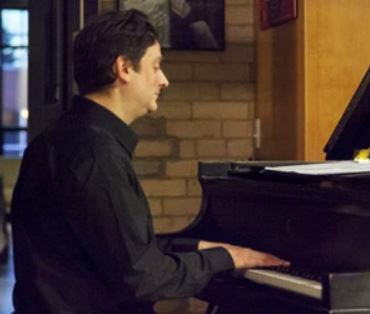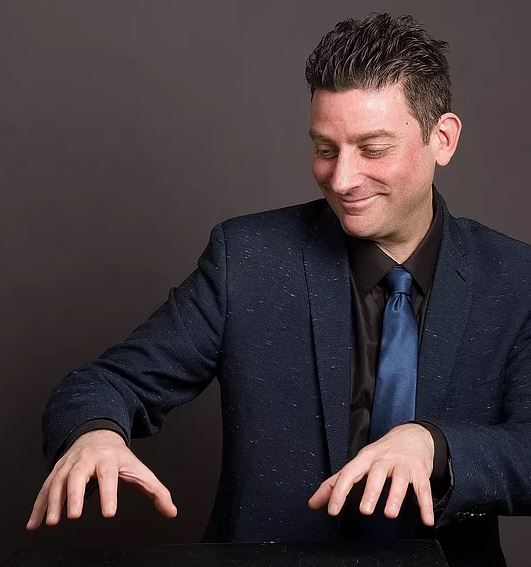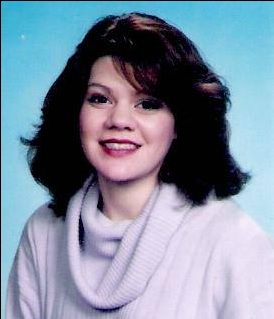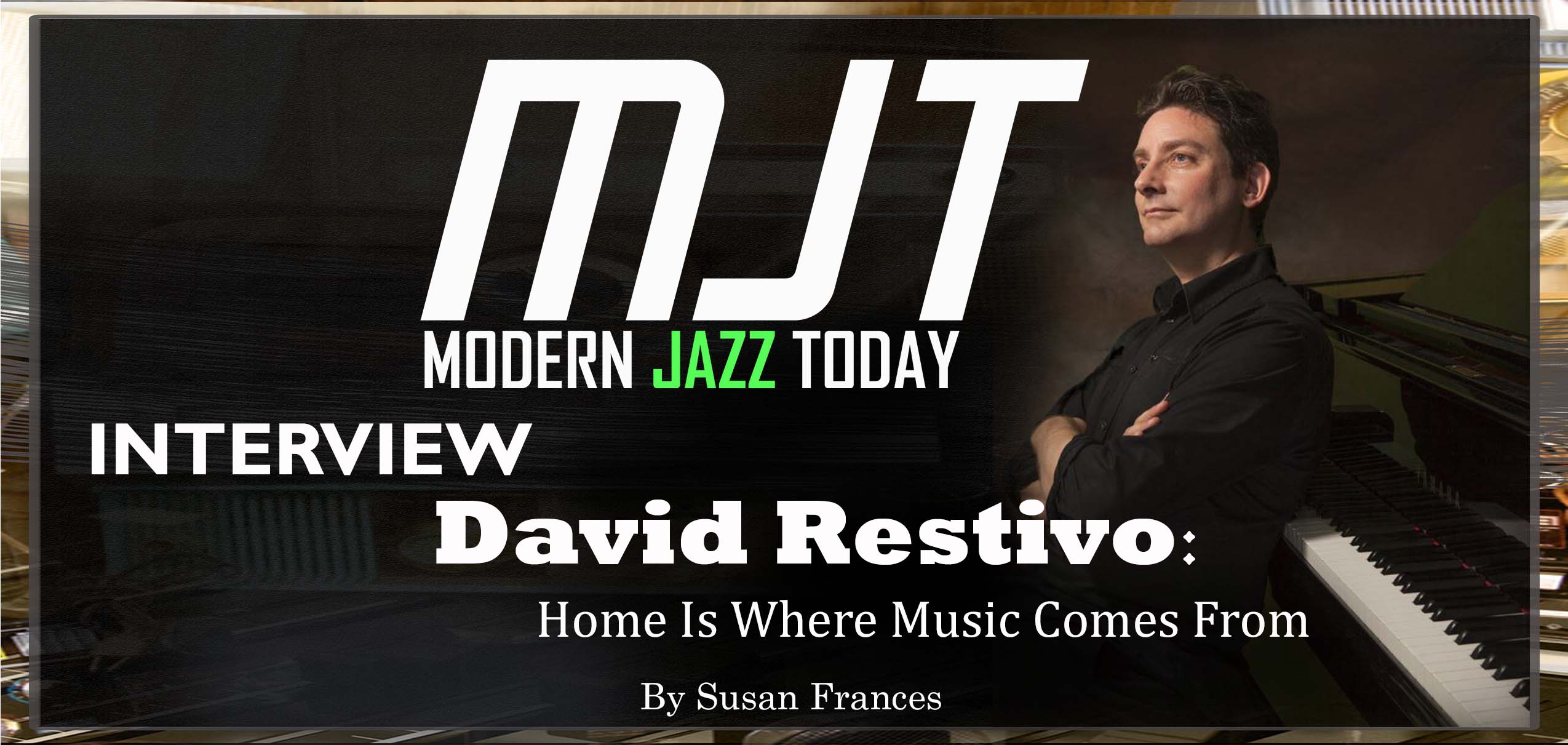David Restivo: Home Is Where Music Comes From
 Acclaimed pianist, composer, arranger, and bandleader David Restivo has called many different cities home, having lived in Lansing, Michigan then moving to Toronto, Canada. Along the way, he had found a place for himself in such locales as New York City, Nova Scotia, and Palermo, Sicily for a time. Whether one is a world traveler or settled in one place all through life, the question remains where does one call home? That sacred place where one feels most comfortable, secure and at peace. To some extent, home is one’s greatest possession and asset. With that in mind, it is no mystery that David Restivo has found his home in the music he creates, and vice versa, his music reflects his home. Intrinsically, his music is his greatest asset.
Acclaimed pianist, composer, arranger, and bandleader David Restivo has called many different cities home, having lived in Lansing, Michigan then moving to Toronto, Canada. Along the way, he had found a place for himself in such locales as New York City, Nova Scotia, and Palermo, Sicily for a time. Whether one is a world traveler or settled in one place all through life, the question remains where does one call home? That sacred place where one feels most comfortable, secure and at peace. To some extent, home is one’s greatest possession and asset. With that in mind, it is no mystery that David Restivo has found his home in the music he creates, and vice versa, his music reflects his home. Intrinsically, his music is his greatest asset.
Restivo’s latest endeavor Arancina is an assortment of original compositions written by him, communicating to audiences the impressions he has experienced about the places he has been to and the cultures he has absorbed. The first four tracks of the recording do so as part of the “Sicilian Suite,” each labelled after a Sicilian city: Catania, Palermo, Modica, and Arancina.
“I have some Sicilian heritage on my father’s side,” he touts, “and I had a chance to spend a brief period of time in Sicily two summers ago. I was struck by the unique landscape and vibrant culture and [notably the] spectacular food, and felt home there in a certain way. That led to some bigger thoughts about what ‘home’ means to me, and the conclusion I came to is that it’s really not so much any external place but more of an inner place that I carry with me, a composite of all the places I’ve lived or spent extended time, and all the cultural roots that flow through me. ”
He translates, “Instrumental music is an abstract form of expression—I tried to capture the sights, sounds, and atmosphere of Sicily in the suite, but another listener might get a whole different set of pictures in their mind; that’s the beauty of art!”
Restivo recorded Arancina with his jazz trio, comprised of Jim Vivian on bass and Alyssa Falk on drums. He recalls how he met his bandmates. “Jim Vivian and I have played together in many different contexts since the late 1980s, including extensively with Rob McConnell and the Boss Brass and saxophonist Mike Murley’s quintet. He is a very lyrical and melodic bassist who can be very interactive but also provide a strong, swinging foundation. We have a strong trust and a shared harmonic language.”
He recollects, “I met New York State-based drummer Alyssa Falk through our mutual friend Chris Budhan, a bassist who brought us together for a summer-long gig on Prince Edward Island. We instantly felt an almost psychic musical connection! As a sometime drummer, the piano-drum relationship is important to me, and I love the way we are able to throw the ball back and forth. She is equal parts fire and sensitivity, and has a deep sense of swing.”
Accompanying the trio is vocalist Fawn Fritzen, who sings on the tracks “Kintsugi” and “Bittersweet Goodbye.” He remembers, “Fawn and I met several years ago when a tour I did with drummer Morgan Childs took me through Whitehorse, Yukon, where she lives. We stayed in touch, and when she came to Toronto to work on her second album, I wrote an arrangement for it and played piano on a couple of tracks.
“A close friendship evolved,” he shares about Fritzen, “which developed into a romantic partnership following the demise of our respective marriages.”
He describes how the tracks “Bittersweet Goodbye” and “Kintsugi” developed with Fritzen as his co-pilot. “‘Bittersweet Goodbye’ started as a melody that I wrote and she added the words later, and ‘Kintsugi’ started the opposite way, as a piece of her poetry that I wrote music around. They were both originally written for her one-woman plus trio show, ‘How To Say Sorry and Other Lessons,’ a personal journey in story and song.”
“Her own recent Chronograph Records release,” he points out, “which bears the same title, features versions of these songs taken from a live performance of the show. I felt that these two songs in particular had a life outside the context of the show and also fit the arc of my own album, so I invited Fawn to revisit them in the studio with Jim and Alyssa and me.”
Though Arancina was released in January 2021, the recording was made prior to the COVID-19 closures going into effect by March 2020, as Restivo clarifies, “The recording was luckily done in August of 2019, so it was done before all the COVID stuff hit.”
Restivo delves into writing process for the recording. “Each of my albums has had a different feel and instrumentation, based on the kind of writing that I was doing at the time. This is my first in the classic piano trio format.”
“The primary motivations,” he cites, “were: feeling like my latest batch of compositions would suit this format; and really wanting to document the particular relationships I have with Jim and Alyssa. Of course, the piano trio tradition in jazz looms large with the bar set by Bill Evans, Oscar Peterson, Nat Cole, Ahmad Jamal, Keith Jarrett, and Brad Meldau. In a way, I had to forget about that legacy and just focus on the joy of playing with my friends, and the wonderful intimacy that the trio format provides.”
The trio demonstrates their kinetic rapport in the the track “Raven’s Wing,” which Restivo examines, “I do a lot of mental and physical preparation in the form of practice, and then when I’m actually performing, whether in the studio or on stage, I try to let go of conscious thought as much as possible and open myself up to ‘the zone,’ which was recently beautifully portrayed in the Pixar film Soul.”
He professes, “I think of improvisation as a form of storytelling. Some research. I read on jazz musicians’ brains bears this out, an abstraction rooted in African griot traditions, so I try to have an arc to that narrative with a beginning, middle, and end.”
In retrospect, Restivo denotes about his songwriting skills, “I think that my writing and playing are less self-conscious now, which is hopefully a sign of some kind of maturity!
 “By that,” he elaborates, “I mean that I feel less concerned with being ‘clever,’ and I worry less about whether my music is too straight ahead or not straight ahead enough, or whatever. I try to make honest music that reflects me, that I can connect with emotionally and spiritually and that will bring the best out in the musicians who collaborate with me.”
“By that,” he elaborates, “I mean that I feel less concerned with being ‘clever,’ and I worry less about whether my music is too straight ahead or not straight ahead enough, or whatever. I try to make honest music that reflects me, that I can connect with emotionally and spiritually and that will bring the best out in the musicians who collaborate with me.”
Music that reflects him, emotionally and spiritually, is a quality that Restivo can trace back to his upbringing. He shares, “My mother was an amateur pianist, and I can remember spending hours as a small child lying under the piano listening to her play Mozart or Schubert. She was also a freelance music critic, so from an early age I got dragged to all kinds of concerts and festivals and had my head filled with every kind of music.”
“I played several instruments as a kid,” he expresses fondly, “including the euphonium and the drums, which I still play, but eventually I was drawn to the piano bench and pretty much never left it!”
He recounts, “At around age 3 or 4, I spent part of a summer with my dad in a house in Michigan owned by some friends of my parents. Already a music freak, I rifled through the owners’ record collection and discovered an album called The Greatest of Dizzy Gillespie. Intrigued by this person’s unusual name, I asked my dad to put it on. I was mesmerized!”
“Eventually,” he juts forward, “I started buying records, and taking the free review copies my mom would get sent that were jazz-related. My biggest early influences were Bud Powell, Charlie Parker, Louis Armstrong, Charles Mingus, and Thelonious Monk, and a little later on, John Coltrane, McCoy Tyner, Bill Evans, Chick Corea, Clifford Brown, and Woody Shaw.”
“I came to Toronto in my teens with my mother and brother,” he furnishes, “after my parents separated. After high school, I went to Humber College and I started to meet and work with musicians on the local jazz scene.”
“Toronto has a rich and vibrant musical history and culture,” he explains, “and of course, I was influenced by the great musicians who were my seniors, such as Don Thompson, Bernie Senensky, and many others. But I also have roots in New York City. My parents were both born there, and I have spent some time living there myself in the early 1990s.
“In many ways,” he highlights about New York City, “I feel more strongly influenced by that city’s musical aesthetic.”
Restivo’s upbringing prepared him to play and compose music but becoming the leader of a jazz trio was another rung he climbed along his accession. “I have been writing music almost as long as I’ve been playing it,” he asserts. “I have been very inspired by great jazz composers like Duke Ellington, Wayne Shorter, and Pat Metheny, but I’ve also listened to a lot of modern European classical music, as well as progressive rock bands like Genesis, and all of those influences seemed to converge when I wrote.”
“In a way,” he predicts, “I felt like my piano playing reflected a similar feeling to many of the jazz pianists of my generation, but that my original voice came out most strongly when I composed. Once I had written a certain amount of original music, of course, I wanted to hear some great players play it, which forced me to be a bandleader!”
Due to technological advances through the 21st century, artists have not only paved their own paths as musicians, composers and bandleaders but they have also become their own promoters, using online retail sites and social media platforms to reach audiences. Restivo profiles the areas in cyberspace that have provided him with an outlet to audiences.
“Bandcamp is great,” Restivo applauds, “because they give a better return to the artist than bigger players like iTunes, and since the pandemic started they have occasional ‘Bandcamp Fridays’ where they relinquish their percentage and give the entire sales to the artists.”
He considers, “I use Facebook mostly for social media, which I find useful. I have stubbornly stayed away from Instagram and Twitter, mostly because I spend too much time online as it is, but I know there is value in multiple avenues of outreach, and my record label and promotional company, Chronograph Records and Orange Grove Publicit. use all of them.”
“Of course,” he weighs, “there are downsides to all of this technology and social media, and the streaming services have decimated the ability of  musicians to make money from music sales or songwriting royalties. But whereas in the past one had to live in a larger centre like New York, Los Angeles, or London to get one’s music noticed, now one can make and promote music from almost anywhere in the world, and study and collaborate with other musicians across the globe.”
musicians to make money from music sales or songwriting royalties. But whereas in the past one had to live in a larger centre like New York, Los Angeles, or London to get one’s music noticed, now one can make and promote music from almost anywhere in the world, and study and collaborate with other musicians across the globe.”
He remarks about such technological advances, “So the positive aspect is that technology has made the world and the musical community, specifically smaller, which is a beautiful thing!”
The big wide world that has made its way into Restivo’s music, through the multiple cultures that he has experienced and the vast musical influences that have made a lasting impression on him, is also made available to that big wide world through technology. In Restivo’s view, the big wide world is much smaller and more accessible to him.
It is often said that home is where the heart is. That sacred place where one feels most comfortable, secure and at peace. The maxim suggests that home is an extension of one’s self. It is an individual’s most cherished and prized asset. It is no mystery that David Restivo’s home is his music.
About Susan Frances:
 Born in Brooklyn, New York and raised in eastern Long Island, I always enjoyed writing and made several contributions to my high school literary magazine, The Lion’s Pen. Influenced by writers of epic novels including Colleen McCullough and James Clavell, I gravitated to creative writing. After graduating from New York University with a BA in Liberal Arts, I tried my hand at conventional jobs but always returned to creative writing. Since 1998, I have been a freelance writer and have over three thousand articles to various e-zines including: Jazz Times, Blogcritics, Yahoo Voices, Goodreads.com, Authors and Books (books.wiseto.com), TheReadingRoom.com, Amazon.com, Epinions.com, Fictiondb.com, LibraryThing.com, BTS emag, BarnesandNoble.com, RomanticHistoricalReviews.com, AReCafe.com, Hybrid Magazine, and BookDepository.com. In 2013 and 2014, I was a judge in the Orange Rose Writing Competition sponsored by the Orange County chapter of the Romance Writers of America located in Brea, California.
Born in Brooklyn, New York and raised in eastern Long Island, I always enjoyed writing and made several contributions to my high school literary magazine, The Lion’s Pen. Influenced by writers of epic novels including Colleen McCullough and James Clavell, I gravitated to creative writing. After graduating from New York University with a BA in Liberal Arts, I tried my hand at conventional jobs but always returned to creative writing. Since 1998, I have been a freelance writer and have over three thousand articles to various e-zines including: Jazz Times, Blogcritics, Yahoo Voices, Goodreads.com, Authors and Books (books.wiseto.com), TheReadingRoom.com, Amazon.com, Epinions.com, Fictiondb.com, LibraryThing.com, BTS emag, BarnesandNoble.com, RomanticHistoricalReviews.com, AReCafe.com, Hybrid Magazine, and BookDepository.com. In 2013 and 2014, I was a judge in the Orange Rose Writing Competition sponsored by the Orange County chapter of the Romance Writers of America located in Brea, California.





1 Comment
David Restivo
Thank you for this, Susan! By the way, I see that you’re from Brooklyn- my dad was born and raised in Flatbush!